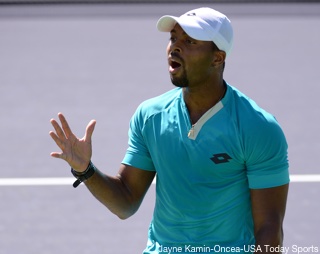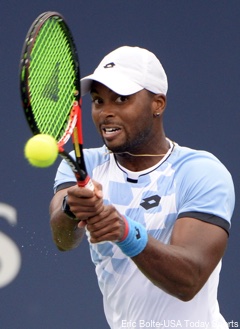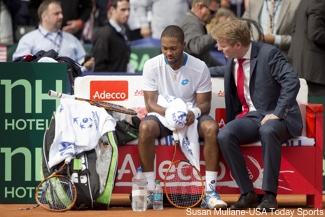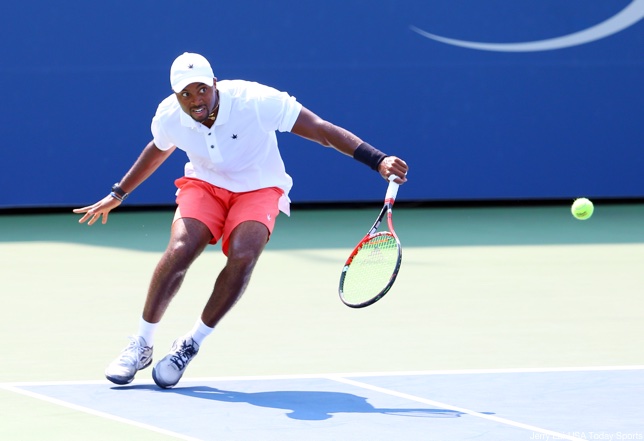Donald Young can picture his 16-year-old self. He was a junior prodigy who was in too much of a rush to be a pro. He took excessive wild-card opportunities rather than building up his game.
"Hindsight is 20/20," Young says. "They were kind of being offered. You're [No.] 1 in the world, you're ready to go and they're offered. Would I not play some of them? Definitely not. But they happened. They were there. The tournaments wanted me to play."
This included the U.S. Open, which he played for the first time in 2005 at 16. But playing all those pro events meant he never had a chance to mature. Entering Tuesday, Young had a 5-10 U.S. Open record.

Then, after a decade of being known as the player who failed to reach the potential he showed as a junior, Young won a match in which he exceeded expectations. He beat No. 11 seed Gilles Simon 2-6, 4-6, 6-4, 6-4, 6-4, for his first U.S. Open win since 2011.
Down 0-3 in the third set, the powerful lefty looked destined for a third straight first-round exit at a Grand Slam. That's when he started showing the kind of game that earned him praise from John McEnroe when Young was 10. Even when Simon broke him to pull even 4-4 in the fifth set, Young kept his game together.
"I was going to go down swinging," he says.
With a Court 17 crowd bouncing off the 7 Train rails, Young pulled out the first 0-2 comeback of his career.
"I give all the credit to them," he says of the fans. "Without those guys -- if it was in France or somewhere else, some random place around the world -- I'm pretty sure I would have lost the match. To look at those people and they keep giving you energy, you can't let them down."
Young is ranked No. 68 in the world. His highest ranking was No. 38 in 2012. It's a little underwhelming for someone who was so accomplished as a junior. In 2003, he won the Orange Bowl (elite world junior tournament) 16-and-under division at age 14, the first American to do so since Jim Courier in 1986. He turned pro in 2004. At 15, he became the youngest Australian Open Juniors champion. At 16, he finished the 2005 season as the youngest junior to be No. 1 at year's end. He won Wimbledon juniors in 2007.

Young made the full transition to the professional circuit in 2008. He entered every Grand Slam and was dispatched in the first round four times. At the U.S. Open, Young lost to countryman James Blake in five sets. After that, Young didn't play four majors in one season again until 2012.
Young's 11 consecutive U.S. Open appearances are the most for any American in this year's field (John Isner is second with nine straight). Mardy Fish is making his 13th appearance, the only American with more Opens than Young.
"I'm not supposed to win all the slams and be the best," Young says. "I can kind of swing a little free. It's like some of the guys had a chance to do when I was at that age. They had a chance to work in private and get better. I'm kind of in that situation now and I'm enjoying it."
For years, Young struggled with the mental part of the game. Unforced errors and on-court emotions undercut Young's talent potential. He cleaned it up. He has seen a sports psychologist. He talks to the game's best players about their mind tactics. He reads.
"I love self-help books," he says with a smile. "I feel like tennis is pretty much all mental."
Young had not taken a set off of Simon in five tries before Tuesday. A younger Young may have rolled over, but this one did not.

Before Tuesday, Young's best U.S. Open moment was upsetting No. 14 seed Stan Wawrinka en route to the fourth round in 2011. The Wawrinka match was also a five-setter on Court 17, which Young says was in the back of his mind Tuesday.
That was a positive thought. Young's new conscience tells him to think good things, unlike his old one.
"I had to deal with that, and I'm dealing with it," he says. "I'm not there, but I'm getting better."
It took Donald Young a decade to figure things out. He is not about to go on a Grand Slam tear, but on Tuesday, he had his moment.
It's the little steps that matter.
-- Follow Jeffrey Eisenband on Twitter @JeffEisenband.





